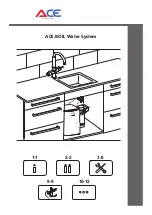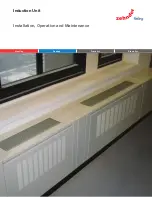
Correct use of all rigging hardware is required for secure system suspension. Careful calculations should
always be performed to ensure that all components are used within their Maximum Load Limit before the array
is suspended. Never exceed the maximum recommended load ratings. Prior to suspending the system, an
expert, trained and experienced in flying speaker systems should be consulted. Research and understand the
codes, practices, and requirements in the venues where you intend to operate your sound system.
INSPECTION & MAINTENANCE
Before suspending or pole mounting any speaker system always inspect all components (enclosure, rigging
frames, pins, eyebolts, track fittings, etc.) for cracks, deformations, corrosion, missing, loose or damaged
parts that could reduce strength and safety of the array. Do not suspend or pole mount the speaker until the
proper corrective action has been taken. Installed systems should be inspected at least annually. The inspection
shall include a visual survey of all corners and load bearing surfaces for signs of cracking, water damage,
de-lamination, or any other condition that may decrease the strength of the loudspeaker enclosure. Accessory
rigging hardware provided with or for the JBL MG1932 / MG1928 or MG1918S / MG1915S louderspeaker must
be inspected for fatigue at least annually or as required by local ordinance. For all other hardware and fittings,
refer to the hardware manufacturer's inspection and maintenance guidelines for process.
ARE YOU NEW TO RIGGING?
If you are new to rigging, you should do the following:
•
Read and study JBL Technical Note Volume 1, Number 14: Basic Principles for Suspending
Loudspeaker Systems (available at http://www.jblpro.com/pub/technote/tn_v1n14.pdf).
•
Know the rules for safe rigging.
•
Attend a safe rigging seminar, such as that presented by professionals like Rigging Seminars™
(www.riggingseminars.com) or by Chain Motor Hoist manufacturers like Columbus McKinnon Corp.
(manufacturers of the C/M Lodestar).
•
Meet and establish a relationship with a licensed mechanical or structural engineer. Get in the habit
of asking them questions instead of guessing about their answers. Learn from what they tell you.
•
Meet and discuss this aspect of your business with your Insurance Agent.
ATTACHMENT TO STRUCTURES
A licensed Professional Engineer must approve the placement and method of attachment to the structure prior
to the installation of any overhead object. The following performance standards should be provided to the
Professional Engineer for design purposes; Uniform Building Code as applicable, Municipal Building Code as
applicable, and Seismic Code as applicable. The installation of the hardware and method of attachment must
be carried out in the manner specified by the Professional Engineer. Improper installation may result in
damage, injury or death.
JBL is not responsible for the application of its products for any purpose or the misuse of this information for any
purpose. Furthermore, JBL is not responsible for the abuse of its products caused by avoiding compliance with
inspection and maintenance procedures or any other abuse.
SUSPENSION SAFETY WARNINGS!
18







































